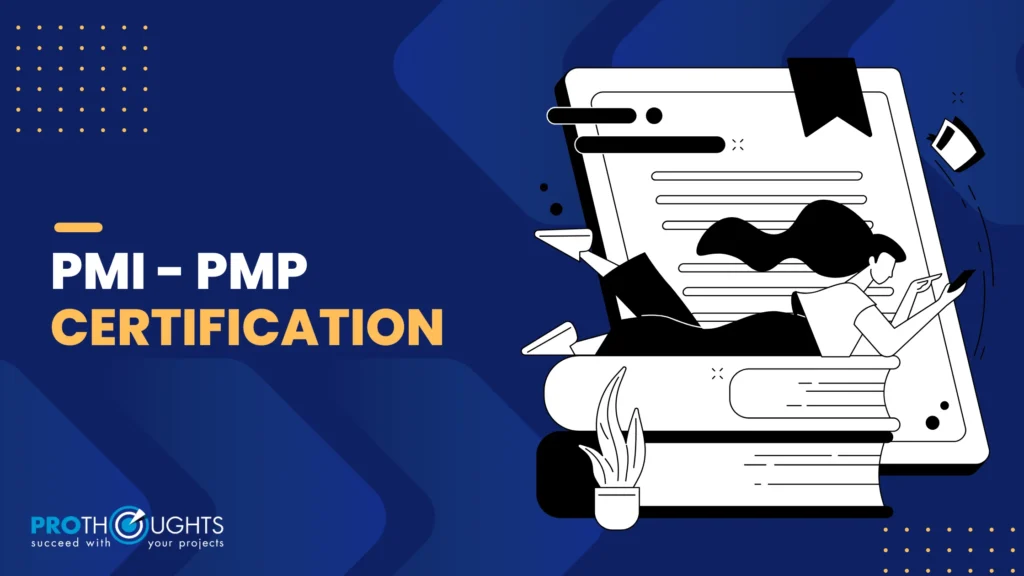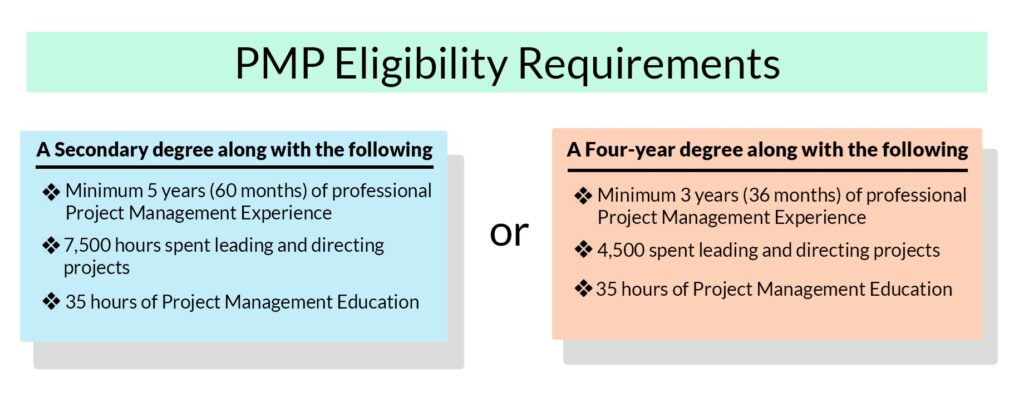Project Management Institute (PMI) is a world-leading USA-based non-profit organization for active professionals in the Project Management Profession (PMP) supported by certifications, research programs, and professional development opportunities.
What is PMI-PMP Certification?
PMI-PMP (Project Management Professional) Certification is an industry-standard highly recognized and accepted globally and applicable to all types of industry domains, including Manufacturing, Retail, Marketing, Banking, Finance, Telecom, Healthcare, Information Technology, Pharmaceuticals, and many others. The PMP Certification offered by PMI is the most sought-after certification ranked at the top level with a higher value in the market and is the highest paying certification. PMP validates the candidate if he/she is skilled in managing any project and can help an organization to solve the problem in the real-time situation that every employer seeks with high demand and retaining the candidates and other side knocking opportunities to professional with high perks, hence, more and more working professionals are turning into PMP Certification that provides credibility, proficiency, ability, better job opportunities, and focused image project manager in the market.
It is essential to understand what resources should be available to the individuals and what preparation is required before embarking on the PMP certification success journey. It is all about meeting educational and professional work experience requirements to make yourself eligible for a PMP application.
What are the eligibility criteria for PMI-PMP Certification?
As per PMI, the educational qualification and experience requirements required for PMP Certification are that candidates need to have real-world experience of at least a minimum of 4 years. (4500 hrs.) for an applicant with a graduation degree or 5 years. (7500 hrs.) for a diploma holder in Project Management in consecutive years. P.S. Professionals don’t need to have experience in Project Management; instead, they can be a working professional and should have spent time leading and directing tasks that are being measured through the PMP Exam across the 5 process groups (Initiating, Planning, Execution, Monitoring & Controlling, Closing). The mapping of tasks with 5 process groups as well proportion to PMP exam questions associated with each process group are well documented by PMI in detail and can be found in the Current PMP Exam Content Outline at the PMI site which is available to download free from PMI site.
1. Non-Overlapping Professional Work Experience Criteria
PMI also says the professional work experience of the candidate should be non-overlapping. In layman’s terms, it means that working professionals are not allowed to count on credit for working on two or more projects simultaneously. After gaining experience in Project Management, any working professional from any industry who wants to pursue PMP Certification can enroll in a 4-Day PMP Workshop with PMP Certification Education Providers who are registered with PMI, the one I would like to recommend here is ProThoughts LLP registered with PMP.
2. The Role of PMP Certification Education Providers
ProThoughts LLP also helps you to prepare for the PMP Exam to get it clear and achieve 35 PDU (Professional Development Units) contact hours of formal project management education that are significantly required to meet the eligibility criteria to appear for the PMP exam. Everything about all these basic eligibility requirements related to PMP Certification set by PMI can be found in the PMP Credential Handbook, which is available to download free from the PMI Site.
3. PMI Membership and its Benefits
Once individuals fulfill all the necessary criteria that need to be met for the PMP exam defined by PMI, they can have the PMI membership. It is a mandatory requirement that is vital for the PMP application at the PMI Site. Without PMI membership, individuals won’t be able to complete and submit PMP applications. So get registered with PMI and set your profile dashboard at the PMI site. The PMI Membership is open to all individuals, and there are no prerequisites. The cost for membership is US$129 plus, while the first-year education cost will be US$10. Because this was your first time joining PMI as a member, the $10 processing fee has been imposed.
As a PMI member, you can access all PMI site contents and even download the Project Management Body of Knowledge (PMBOK) for free. It is a textbook guide document for the PMP exam published by PMI which is referred to during the 4-Day workshop by PMP educational providers.
4. Steps to Complete and Submit the PMP Application
PMP application needs to be filled up carefully; all requested details, including the individual’s Name, Contact Details, Educational Details, Project Experience, and Organization Details to be duly filled. There are two most important factors to meet the PMP exam eligibility criteria; firstly, you have to state in brief about the project experience with enough information, specifically the work you have done.
5. Payment and Scheduling of the PMP Exam
After submitting your application, you will be informed through your email and informed that your application has been approved, and you will be required to pay for the examination. You will also be able to download the completed application from the PMI site with the login details that were used to sign in for the first time with the PMI website. Once you complete the payment section, there will be a payment confirmation, and details on the next procedure on how to schedule for the PPM (PMP) exam. Check your email address for your eligibility and scheduling information.
6. Guidelines for Taking the PMP Exam Online
Tests are administered by PMI, enabling candidates to take the exam online from their place as per convenience. At the PMI site, there will be prompts to schedule your online proctored exam through Pearson VUE. There is an “Availability” button you can click to check the dates that are available currently. It, however, must be pointed out that the availability of seats is dynamic, and to that extent, while PMI may assist in arranging capacity, PMI cannot guarantee a seat for any participant to be kept specifically for them before the actual event.
As a prerequisite to sitting an examination, the candidates need to make sure they have a Windows 10 system and a broadband/ Wireless connection with good internet connectivity and a good quality webcam and microphone. The candidate needs to sit in a separate room to avoid disturbance during the exam. The following PMI guidelines need to be followed- no break, no looking back or side, no disturbance, no paper pen allowed during the exam. More exam booking information available at home.pearsonvue.com/pmi/onvue.
How is the PMI-PMP Certification Exam conducted?
Before starting, log in to the website to start the Online Proctored process, which will check the system requirements. Candidates should start the process with the access code. An online proctor will take around 25 mins to verify the identity of the candidate and system configuration. However, if any wrongdoing is detected, it will be reported to Pearson VUE and PMI with evidence, terminating the candidate. Besides, the PMI may take action to revoke your existing certification and all future participation in the PMI certification program.
1. Exam Format and Question Types:
PMI supervises the PMP exam. The total duration of the PMP exam is 4 hours covering 200 multiple choice questions format. There is no negative marking for wrong answers. You can also mark questions for review and revisit them at the end. However, you should attempt all the 200 questions in the given time.
2. PMP Exam Preparation Tips
- Review the PMP Credential Handbook to understand the exam process and requirements.
- Study the PMP Exam Content Outline for an overview of exam topics.
- Refer to the latest edition of the PMBOK Guide for comprehensive project management concepts.
- Practice using the PMP Sample Questions document for better exam preparation.
- Explore current titles in project management to enhance your knowledge.
Also, enroll in a formal study course offered by PMI chapters or Registered Education Providers (R.E.P.s). Form a study group with colleagues or friends. (You can meet in person or virtually.)
Moreover, PMP candidates can attempt the exam up to three times within a one-year eligibility period to earn the credential. To receive a new eligibility I.D. and schedule your original exam, please submit payment for the re-exam.
The major updates to the sixth edition are summarized below:
There are five process groups, ten knowledge areas, and 49 processes.
A new chapter emphasizes the project manager’s role in effectively leading with essential competencies, skills, and experience.
Two Knowledge Areas have been renamed to more accurately reflect which elements can be managed and which cannot:
Time Management is now renamed as Schedule Management; Human Resource Management becomes Resource Management.
Every Knowledge Area features four new sections
1. Key Concepts
2. Trends and Emerging Practices
3. Tailoring Considerations
4. Considerations for Agile/Adaptive Environments
The sixth edition will also present new content around considerations for agile/adaptive environments and the PMI Talent Triangle®.
This helps professionals to expand their horizons into the Project Management Domain while growing professionally and personally.







